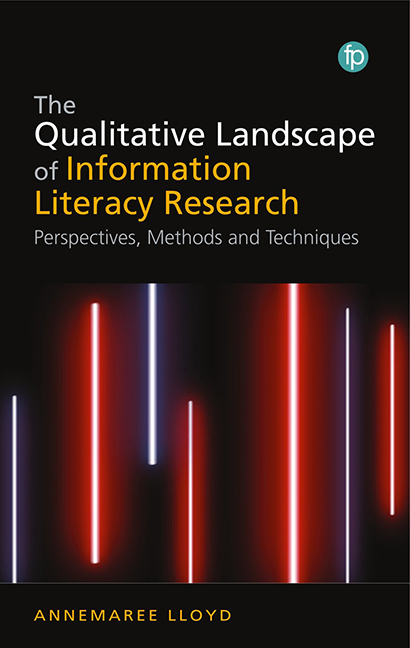Book contents
- Frontmatter
- Contents
- Figures
- Foreword
- Acknowledgements
- Introduction: The Qualitative Landscape of Information Literacy Research
- Chapter 1 Situating Information Literacy Research
- Chapter 2 Informing Information Literacy Research
- Chapter 3 Framing Information Literacy as an Educational Practice for Research. Learning Theories and Models
- Chapter 4 Qualitative Methods in Information Literacy Research
- Chapter 5 Collecting Data About Information Literacy: Data Collection Techniques
- Chapter 6 Planning for Research
- Chapter 7 Qualitatively Speaking and Doing Information Literacy Research
- References
- Index
Chapter 7 - Qualitatively Speaking and Doing Information Literacy Research
Published online by Cambridge University Press: 21 October 2021
- Frontmatter
- Contents
- Figures
- Foreword
- Acknowledgements
- Introduction: The Qualitative Landscape of Information Literacy Research
- Chapter 1 Situating Information Literacy Research
- Chapter 2 Informing Information Literacy Research
- Chapter 3 Framing Information Literacy as an Educational Practice for Research. Learning Theories and Models
- Chapter 4 Qualitative Methods in Information Literacy Research
- Chapter 5 Collecting Data About Information Literacy: Data Collection Techniques
- Chapter 6 Planning for Research
- Chapter 7 Qualitatively Speaking and Doing Information Literacy Research
- References
- Index
Summary
Introduction
Information literacy continues to grow as a major area of research within the library and information science field and is being critically interrogated and interpreted through a wide range of theories and methods. Over the last ten years the application of creative qualitative research methods and techniques has enriched our understanding of the area by weaving a rich and intricate tapestry of how the practice of information literacy emerges, is enacted and becomes embodied as part of larger practices and settings.
Qualitative perspectives and methods provide information literacy researchers with a suite of methodological tools which enable researchers to understand how information literacy practices are shaped, enabled and emerge as ways of knowing. The results of qualitatively informed information literacy research conducted to date have highlighted the ability of researchers to look beyond traditional notions of information literacy and perceive the practice differently.
The qualitative perspectives, social theories and methods that are highlighted in this book have been employed by researchers to unravel the complexity of information literacy practice. They achieve this by pivoting our attention towards the lived experience of practice and enable us to develop a deeper understanding about the role of context and social site in shaping what knowledges and ways of knowing meaningfully matter. This perspective challenges the traditional, standard and reductionist view of information as something that is tangibly expressed and articulated through conventional print or digital resources.
Like all practices, information literacy is contextual and is therefore shaped by the truths through which the context and its settings are constructed which in turn influences the way people speak, act, do and relate. Information literacy is a practice that has different contexts, different concepts and different truths (Lloyd, 2005).
While this statement may seem quite simple, it belies a complexity about information literacy which can only emerge through interrogations of the practice that focus on deeply sociological and dialogical untangling and mapping of the practice elements. The practice of information literacy does not emerge in isolation, nor can it be represented in isolation as a set of generic skills or metaliteracy set apart from conditions and arrangement of the social site, because, as qualitative research has begun to demonstrate, these literacies and skills are shaped discursively.
- Type
- Chapter
- Information
- The Qualitative Landscape of Information Literacy ResearchPerspectives, Methods and Techniques, pp. 119 - 126Publisher: FacetPrint publication year: 2021



